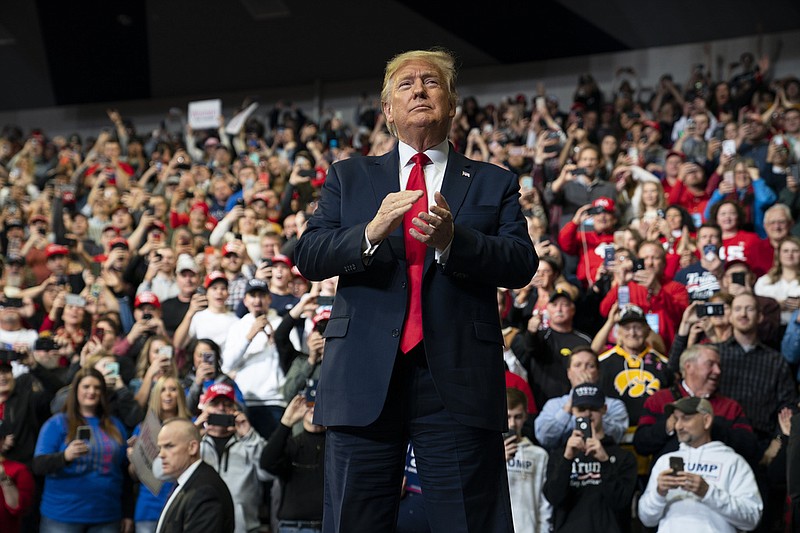By THOMAS BEAUMONT
Associated Press
DAVENPORT, Iowa (AP) -- To outsiders, they looked like simple stacks of paper. But for Donald Trump's first presidential campaign, they represented a missed opportunity.
A month before Iowa's 2016 presidential caucuses, mountains of so-called pledge cards sat in the corner of Trump's suburban Des Moines state headquarters. They contained the names and contact information of roughly 10,000 Iowans who attended Trump campaign events and responded by returning the cards suggesting they were open to backing the reality television star who was now seeking the White House.
In what's considered political malpractice by Iowa standards, those who returned the cards received no follow-up contact from the campaign.
"None of that data was used. None of it was entered," said Alex Latcham, the former political director for the Iowa Republican Party and now Trump's early-voting state director. "And those people weren't encouraged or mobilized to caucus."
As Trump returns to Iowa on Monday, he and his team are aiming for a more disciplined approach. They are particularly focused on building the data and digital engagement he will need to persuade Iowans to traipse through the cold and snow early next year to participate in the caucuses.
Though his swing through the eastern city of Davenport marks his first trip to Iowa since launching his third bid for the presidency, he's held roughly three dozen events in the state since entering political life. They include several rallies that have attracted thousands since he left office in 2021.
His team is using information from those events to compile an exhaustive list of supporters to engage. The list now includes the data from the 2016 campaign that sat gathering dust.
"One of the advantages we have is that's an awful lot of data," said Trump senior consultant Chris LaCivita. "From every donor to rally attendee, we have all that information, which is important in a state like Iowa. This is ground-game stuff. It's about finding and identifying favorable voters and making sure the campaign is turning them out."
In the early phase of the 2024 campaign, Trump remains in a dominant position. But he faces notable challenges, including growing interest in the expected candidacy of Florida Gov. Ron DeSantis, who made his debut swing through Iowa last week.
Early polls show Trump remains widely popular among Iowa Republicans, though views of the former president have slipped somewhat since he left the White House. Now, 80% say they have a favorable rating of Trump, down slightly from 91% in September 2021, according to a Des Moines Register/Mediacom poll released Friday.
The poll found DeSantis also gets a rosy review from Iowa Republicans, with 74% saying they have a favorable rating. Notably, DeSantis has high name recognition in a state over 1,000 miles away from his own; just 20% say they aren't sure how to rate him.
The dynamics make the stakes particularly high for Trump in Iowa. As a former president who boasts of his standing atop the GOP, he can't afford even a narrow loss in the contest that kicks off the nomination process. Trump on Monday will deliver what has been billed as an education policy speech, but he is expected to touch more broadly on his accomplishments as president and his agenda for another term, including trade policies and agriculture, according to a person familiar with his plans who spoke on condition of anonymity to preview his remarks.

